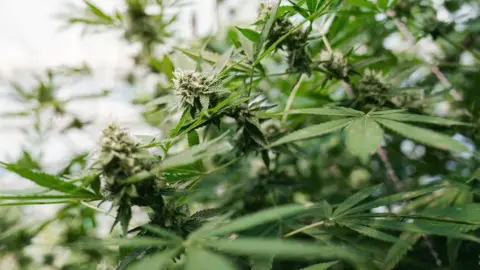The recent reports from the United Kingdom indicate a remarkable decline in the volume of mail-order cannabis being imported from Thailand, with figures showing a 90% decrease in just three months. This substantial drop is attributed to enhanced cooperation between UK authorities and Thai Customs. According to the Home Office, the quantity of cannabis sent to the UK from Thailand plummeted from 15 tonnes, discovered in the last quarter of the previous year, to merely 1.5 tonnes in the subsequent quarter.
The situation escalated following Thailand’s decision to decriminalize cannabis in 2022, which inadvertently led to an influx of illegal shipments that put a strain on the UK Border Force operations. In response to this rampant issue, a new agreement mandated that parcels originating from Thailand undergo verification before being dispatched to the UK. This strategic move has shown immediate results, highlighting the significance of international cooperation in addressing drug trafficking challenges.
Border Minister Seema Malhotra hailed this agreement as a prime illustration of how international collaboration can effectively support the Labour Government’s objective to ensure “safer streets” for all citizens. Malhotra emphasized that this initiative not only disrupts organized crime but also safeguards communities, thereby allowing the Border Force to redirect focus to other pressing matters.
The enhanced security measures implemented by Thai Customs have been instrumental in combating drug smuggling. According to the Home Office, more than 800 suspected cannabis traffickers were intercepted between October 2024 and March 2025. During this timeframe, Thai authorities seized over nine tonnes of cannabis, underscoring their commitment to tackling this issue at its source.
Malhotra articulated the government’s resolve to continue working closely with Thai authorities to apprehend those attempting to traffic illicit drugs into the UK. By cutting off the supply chain at the source, UK authorities aim to significantly mitigate the threat posed by organized crime syndicates that profit from such activities. Last year was particularly notable for illegal drug seizures in the UK, with Border Force and police forces collectively uncovering a staggering 119 tonnes of illicit substances, valued at approximately £3 billion. This statistic marked a substantial annual increase of 52%, as reported by the Metropolitan Police.
In a separate operation, the Home Office reported the interception of £6 million worth of cannabis at Bangkok Airport, a result of a collaborative effort involving Border Force and officers from the National Crime Agency (NCA) stationed in Thailand. Since the inception of Operation Chaophraya in July 2024, over 50 British nationals have faced arrests in Thailand for attempting to smuggle cannabis, indicating the international scope of this ongoing problem.
Phil Douglas, the Director General of Border Force, emphasized the organization’s commitment to fighting drug smuggling and securing the UK’s borders. He noted that their efforts extend beyond the borders, as they collaborate with international partners to prevent illegal goods from ever reaching the UK. Douglas pointed out that the Border Force is leveraging advanced intelligence strategies more than ever, leading to a record number of drug seizures, including high-harm substances.
In conclusion, the dramatic 90% reduction in cannabis shipments from Thailand to the UK is a significant victory for law enforcement agencies on both ends. As the UK continues to enhance its border security and collaborate with international partners, it aims to maintain the momentum in combating drug trafficking and ensuring public safety. This collaborative approach not only aims to dismantle drug networks but also emphasizes the importance of proactive measures to deter potential traffickers from engaging in illegal activities.



